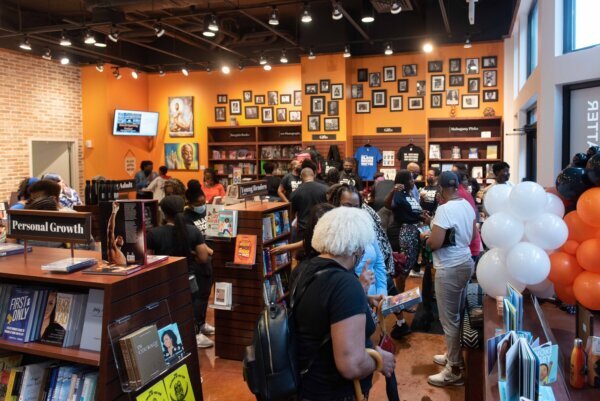This video is no longer available.
Throughout February, WTOP is celebrating Black History Month. Join us on air and online as we bring you the stories, people and places that make up our diverse community.
Nestled in a cozy corner of National Harbor, filled to the brim with shelves adorned with literary treasures and walls adorned with iconic Black figures, MahoganyBooks stands as a testament to the resilience and importance of Black-owned bookstores in America.
Co-founded in 2007 by Ramunda and Derrick Young, MahoganyBooks was born out of a simple yet powerful vision — to make Black literature accessible to communities across the United States.
From its humble beginnings as an online bookstore run out of a one-bedroom apartment in Alexandria, Virginia, to its current presence as an online bookstore with two physical stores in D.C. and Oxon Hill, Maryland, MahoganyBooks has been a beacon of cultural significance and empowerment.
“Our mission was clear from the start,” said Tulsa, Oklahoma-born co-owner Ramunda Young in an interview with WTOP. “We wanted to make Black books accessible no matter where you live. It was important to us then, and it’s important to us now.”
“I grew up in Southeast D.C. and I was used to having access to Black books, whereas Ramunda wasn’t,” said co-owner Derrick Young, emphasizing the significance of their endeavor. “We wanted to make sure that people across the country, no matter if you’re in Minnesota (or) West Virginia, would have access to the same quality books that I had access to.”
The couple’s dedication to promoting Black literature extends beyond mere commerce; it’s a cultural imperative.
“Black bookstores are crucial,” said Ramunda. “Our information, our history cannot always be found in mainstream bookstores. Having our perspective, our point of view, our journey on the shelves — from a Black person’s perspective — speaks volumes.”

Addressing the timely issue of banned books and the suppression of Black history in schools and libraries across the country, Ramunda emphasized MahoganyBooks’ commitment to ensuring that vital narratives are not silenced.
“Banned books are a primary priority for us in our bookstore,” she stated. “Regardless of what others in government and politics say, we know the inherent value of preserving our history and stories. Our shelves will always hold the books that others may deem unimportant, because we understand their significance in preserving our collective narrative.”
When asked if they perceive a decline in reading, Derrick challenged the notion, citing an increase in interest when books resonate with readers. “If you give a kid a book that excites them, they’re reading. That’s what I’m more interested in,” he stated.
As Black History Month draws to a close, MahoganyBooks reflects on its contributions to the celebration and looks ahead to ongoing initiatives.
“Black history happens 12 months out of the year,” said Ramunda.
From hosting renowned authors like Natasha Alfred and April Ryan to organizing ongoing book clubs and community events, MahoganyBooks aims to keep the spirit of Black history alive every day of the year.
Ramunda reiterated the importance of recognizing Black history as integral to the larger American story.
“Black history is American history,” she emphasized. “I encourage people who don’t look like me, who are not Black, to come into this store (and) to be open to reading books that don’t reflect them specifically, but reflect us.”
Get breaking news and daily headlines delivered to your email inbox by signing up here.
© 2024 WTOP. All Rights Reserved. This website is not intended for users located within the European Economic Area.








